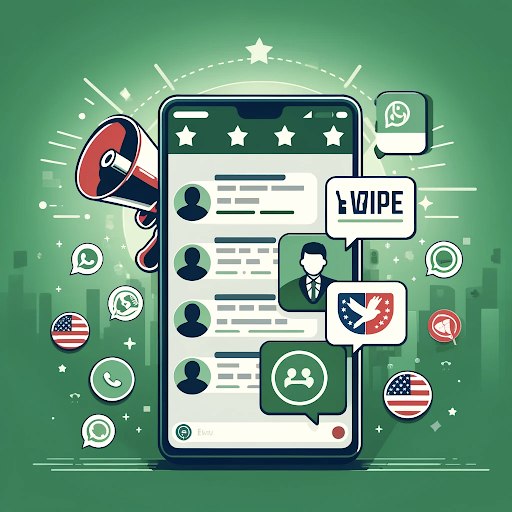In the era of digital communication, WhatsApp has emerged as a significant platform for political marketing. With over two billion users worldwide, it offers campaigns a unique opportunity to engage with voters in a more personal and direct manner. This article explores the strategies, benefits, and challenges of political marketing on WhatsApp, highlighting how campaigns can effectively leverage this platform to connect with constituents.
The Growing Popularity of WhatsApp
WhatsApp’s popularity stems from its user-friendly interface and privacy features. Unlike traditional social media platforms, WhatsApp allows for encrypted messaging, making conversations feel more intimate and secure. This characteristic is particularly appealing for political campaigns that seek to build trust and foster genuine connections with voters. The platform’s widespread use across various demographics further amplifies its potential for reaching diverse audiences.
Direct Communication with Voters
One of WhatsApp’s primary advantages for political marketing is the ability to communicate directly with voters. Campaigns can create dedicated groups or broadcast lists to share updates, mobilize support, and disseminate important information. This direct line of communication allows campaigns to engage with constituents in real-time and respond to questions and concerns promptly.
Moreover, the nature of WhatsApp messages encourages more meaningful interactions. Voters may feel more comfortable reaching out to campaigns with their inquiries or feedback, fostering a sense of community and involvement.
Building Grassroots Support
WhatsApp is particularly effective for grassroots organizing. Campaigns can leverage the platform to mobilize volunteers, coordinate events, and encourage local activism. By creating community groups, campaigns can foster discussions around critical issues, share campaign goals, and inspire collective action.
Additionally, WhatsApp’s sharing features allow users to easily forward messages and information to their contacts, amplifying the campaign’s reach. This grassroots approach can significantly enhance voter engagement as supporters become advocates within their social circles.
Tailoring Messages for Specific Audiences
Political marketing on WhatsApp allows campaigns to tailor their messages to specific audiences. By segmenting contacts based on demographics, interests, or previous interactions, campaigns can craft personalized content that resonates with different voter groups. This targeted messaging increases the likelihood of engagement and supports the development of a more loyal voter base.
For instance, a campaign might send different messages to young voters, focusing on issues like education and employment while reaching out to older voters with content related to healthcare and social security. This level of personalization helps candidates connect more effectively with constituents.
Utilizing Multimedia Content
WhatsApp supports various content formats, including text, images, videos, and voice messages. Political digital campaigns can leverage these multimedia capabilities to create engaging and dynamic content. For example, short videos highlighting a candidate’s policies or community events can capture attention more effectively than text alone.
Infographics and images can also convey complex information in a digestible manner, making it easier for voters to understand key issues. By utilizing diverse content types, campaigns can keep their communications fresh and engaging, encouraging higher interaction rates.
Engaging with Voter Feedback
WhatsApp facilitates two-way communication, allowing campaigns to gather valuable feedback from voters. Through polls, surveys, or open discussions in group chats, campaigns can gain insights into voter concerns, preferences, and perceptions. This feedback loop is crucial for refining campaign strategies and ensuring that messaging aligns with constituents’ needs.
By actively seeking and responding to voter input, campaigns demonstrate their commitment to listening and engaging with the electorate, which can enhance trust and support.
Overcoming Challenges of Misinformation
While WhatsApp offers numerous advantages for political marketing, it also presents challenges, particularly concerning the spread of misinformation. The platform’s encrypted nature can make it challenging to monitor and address false claims or misleading information. Campaigns must remain vigilant in combating misinformation, providing accurate information and clarifying any misconceptions that may arise.
Additionally, campaigns should educate their supporters on how to identify credible sources and verify information before sharing, fostering a more informed electorate.
Compliance and Regulations
Political marketing on WhatsApp must adhere to various regulations and ethical considerations. Campaigns should ensure that they have obtained consent before adding individuals to groups or sending messages. Respecting privacy and data protection laws is paramount in maintaining voter trust and avoiding potential legal issues.
Transparency about campaign affiliations and funding sources is also essential. Clear communication regarding who is behind the messages helps build credibility and trust with constituents.
Measuring Effectiveness
To gauge the effectiveness of political marketing efforts on WhatsApp, campaigns should establish metrics to track engagement and interaction rates. Analyzing open rates, response rates, and message sharing can provide valuable insights into how healthy campaigns are connecting with voters.
Regularly assessing these metrics allows campaigns to refine their strategies and improve their outreach efforts, ensuring they remain responsive to voter needs and preferences.
The Future of Political Marketing on WhatsApp
As digital communication continues to evolve, WhatsApp’s role in political marketing is likely to grow. Campaigns that embrace this platform can capitalize on its potential to foster genuine connections with voters, build grassroots support, and facilitate meaningful engagement.
Looking ahead, advancements in technology may further enhance WhatsApp’s capabilities, allowing for even more innovative ways to connect with constituents. Campaigns that remain adaptable and responsive to changing dynamics will be well-positioned to succeed in this landscape.
Conclusion
Political marketing on WhatsApp presents a unique opportunity for campaigns to engage directly with voters in a personal and meaningful way. By leveraging the platform’s capabilities for direct communication, targeted messaging, and grassroots organizing, campaigns can enhance their outreach and build strong connections with constituents. However, navigating challenges such as misinformation and compliance is crucial to maintaining trust and credibility.



